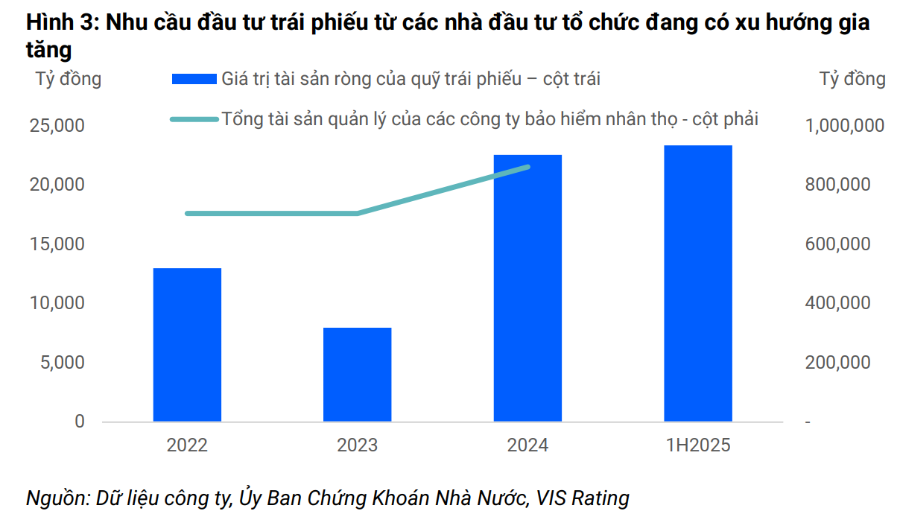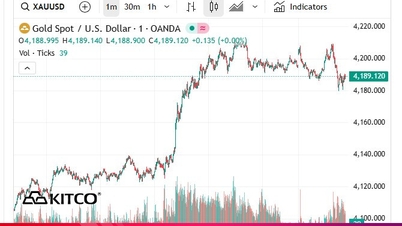Market paradox and the need for reform
The corporate bond market is entering an important phase of transformation, but at the same time it is also revealing many paradoxes. An in-depth report on the Vietnamese bond market recently published by VIS Rating shows that one of the biggest barriers today is the limited investor base.

Under current regulations, banks and insurance companies are not allowed to invest in bonds issued for refinancing purposes. This narrows the pool of potential investors, increases the cost of capital, and pushes refinancing bond interest rates in the 2024-2025 period to 11-13%, significantly higher than the average bank lending interest rate. When the volume of maturing bonds peaks, the pressure to refinance becomes even more intense, putting many businesses in a difficult position. Faced with this situation, in September 2025, the Ministry of Finance announced the roadmap for developing investment funds for the 2026-2030 period, including a proposal to remove this restriction. If approved, commercial banks and insurance companies will be able to participate strongly in the refinancing market, expand the investor base, and reduce mobilization costs for businesses.
However, the problem with bonds is not limited to the refinancing stage. Compared to the bank loan channel, bond financing is still less competitive for long-term projects. The reason lies in the complicated issuance mechanism: each mobilization stage requires separate documents and approvals, while the solution of issuing a single bond code is limited by regulations that only allow offering within 6 months from the first round. This makes bonds difficult to become the priority choice for projects lasting many years.
Another difficulty arises from July 2024, when credit institutions are restricted in managing collateral for bonds. This is an essential service to strengthen investor confidence, but the tightening has reduced market capacity in the context of increasing issuance demand. In addition, the market currently has an imbalance of supply and demand. Demand for investment in fixed income securities has increased sharply, with funds' assets under management (AUM) increasing fourfold since 2023. However, the supply of high-quality bonds is scarce. In particular, the group of institutional investors is very interested in industries with stable cash flows such as infrastructure and utilities, but these industries have a modest issuance history. In contrast, real estate - which has many potential risks - still accounts for a large proportion, creating a large gap in the need for portfolio diversification.
Unlocking new capital solutions for infrastructure and sustainable development
Infrastructure development is considered the backbone of economic growth and is also the sector with the most stable and long-term capital demand. However, to attract this capital flow, the market needs a synchronous strategy that is both stable in policy and creative in financial instrument design.
According to VIS Rating, policy consistency is key. Infrastructure projects have a life cycle of 15-20 years, are highly leveraged and depend on a single source of revenue, so they are vulnerable to policy fluctuations and construction risks. Therefore, establishing a clear legal framework for issuance, combined with post-issuance monitoring mechanisms - such as collateral management, escrow accounts and transparent disbursement processes - will be the foundation to strengthen the confidence of long-term investors. In addition, ESG (Environmental, Social and Governance) is becoming a mandatory "passport" for Vietnamese enterprises to access international capital. Domestic investors can be flexible, but international organizations require strict and consistent compliance. Integrating ESG not only helps reduce capital costs, but also improves the quality of issuance and the competitiveness of Vietnamese enterprises in the global market. Another key solution is to enhance credibility. Credit guarantees, especially during the construction phase of infrastructure projects, are seen as an important catalyst. International experience shows that full or partial payment guarantees from reputable institutions such as CGIF can significantly enhance the attractiveness of bonds. The successful deals of Gelex (2019) and Phenikaa (2023) when issuing guaranteed bonds to international insurance companies have clearly demonstrated the effectiveness of this mechanism.
According to VIS Rating, the role of credit rating agencies is also increasingly emphasized. Credit ratings provide independent assessments of financial structures and ESG compliance, helping investors quantify risks and price appropriately, especially with new instruments such as green bonds and sustainable development bonds. In the context of the Vietnamese market aiming for green growth, the participation of credit ratings will be an important lever to improve transparency and attract international capital. For the capital market to truly have depth, the participation of institutional investors and development banks is indispensable. In countries in the region, a strong investor base - including pension funds, insurance companies and development institutions such as ADB and IFC - has helped PPP projects in the infrastructure sector to issue bonds with maturities of up to 50 years. Meanwhile, in Vietnam, the Social Insurance Fund and private pension funds are not yet allowed to participate in the corporate bond market; life insurance companies, despite managing large assets, allocate less than 10% to this type.
A VIS Rating survey shows that legal and regulatory reform (47%) and expanding the investor base (27%) are the two top priorities for the in-depth development of Vietnam's bond market. This is a clear consensus from the market community. If legal barriers are removed according to the Ministry of Finance's 2026-2027 roadmap, Vietnam can unlock a huge source of long-term capital, enough to finance the country's ambitious economic and infrastructure development goals - VIS Rating commented.
Source: https://daibieunhandan.vn/khai-mo-dong-von-dai-han-cho-ha-tang-10388313.html







































![[Photo] General Secretary To Lam and National Assembly Chairman Tran Thanh Man attend the 80th Anniversary of the Traditional Day of the Vietnamese Inspection Sector](https://vphoto.vietnam.vn/thumb/1200x675/vietnam/resource/IMAGE/2025/11/17/1763356362984_a2-bnd-7940-3561-jpg.webp)










































































Comment (0)